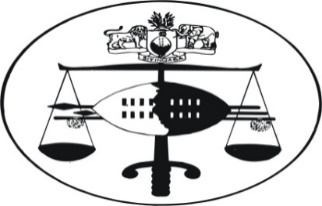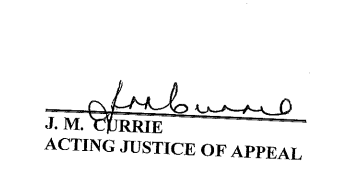
IN THE SUPREME COURT OF ESWATINI
JUDGMENT
Case No. 32/2020
HELD AT MBABANE
In the matter between:
JABULANI M MNDZEBELE Applicant
And
NONHLANHLA SHONGWE Respondent
In re:
NONHLANHLA SHONGWE Appellant
And
JABULANI M MNDZEBELE Respondent
Neutral Citation: Nonhlanhla Shongwe vs Jabulani M Mndzebele (32/2020) [2021] SZSC 24 (13/09/2021)
Coram: J.M. CURRIE AJA.
Heard: 24th August, 2021.
Delivered: 13th September, 2021.
SUMMARY : Civil procedure – Application that appeal be deemed abandoned in terms of Rule 30 (4), no record of appeal filed – No application for extension of time –– Application by Applicant in terms of Rule 17 seeking condonation for late filing of heads of argument – Condonation granted – Appeal deemed abandoned – Costs awarded on the ordinary scale.
JUDGMENT
CURRIE – AJA
INTRODUCTION & SEQUENCE
[1] This is an application by the Applicant/Respondent declaring that the Appeal dated 28th May 2020 be deemed abandoned in terms of Rule 30 (4) of the rules of this Court and seeking costs of the application.
[2] After noting the Appeal in 2020 no record of the proceedings in the Court a quo were filed, nor was any extension of time sought in terms of Rule 16 (1).
[3] On the 18th August 2020 the Applicant filed the present application and served same on the Respondent’s Attorney. No notice to oppose nor any opposing affidavit were filed by the Respondent.
[4] On the 21st July 2021 the Applicant, who was unrepresented, filed an application seeking condonation for the late filing of his Heads of Argument in terms of Rule 17 of the rules of this Court which condonation was granted. On 24th August 2021 the Appellant filed a notice of withdrawal of the application which was clearly meant to be a notice of withdrawal of the Appeal.
[5] There was no appearance by the Respondent and the Applicant appeared in person.
RULES OF THIS COURT
[6] The relevant provisions of Rule 30 of the Rules of this Court provide that:
“30. (1) The Appellant shall prepare the Record of Appeal in accordance with sub-rules (5) and (6) hereof and shall within two months of the date of noting of the Appeal lodge a copy thereof with the Registrar of the High Court for certification as correct.
30. (4) Subject to Rule 16 (1), if an Appellant fails to note an Appeal or to submit or resubmit the Record of Certification within the time provided by this Rule, the Appeal shall be deemed to have been abandoned.
Rule 31 (1) of the Rules of this Court provide as follows:
“31 (1) In every Civil Appeal and in every Criminal Appeal the Appellant shall, not later than twenty eight days before the hearing of the Appeal, file with the Registrar six copies of the main Heads of Argument to be presented on Appeal, together with a list of the main authorities to be quoted in support of each head.”
Rule 16 of the Rules of this Court provides as follows:
“Rule 16 (1) The Judge President or any Judge of Appeal designated by him may on application extend any time prescribed by these rules: provided that the Judge President or such Judge of appeal may if he thinks fit refer the Application to the Court of Appeal for decision.
Rule 16 (2) An Application for extension shall be supported by an Affidavit setting forth good and substantial reasons for the Application and where the Application is for leave to Appeal the Affidavit shall contain grounds of Appeal which prima facie show good cause for leave to be granted.”
Rule 17 of the Rules of this Court provides as follows:
“Rule 17 The Court of Appeal may on application and for sufficient cause shown, excuse any party from compliance with any of these Rules and may give such directions in matters of practice and procedure as it considers just and expedient.”
[7] The above rules are clear and unambiguous and set out the obligations of a party who notes an appeal and is required to file a record as set out in Rule 30; Heads of Argument in the fashion set out in Rule 31 and failing that, as provided for in the case law which will be referred to below, to bring applications as set out in Rules 16 and/or 17 above.
[8] The relevant case law relating to the activities referred to above have been referred to ad nauseum by this Court but practitioners continue to flagrantly disregard the rules of this Court and abuse the Court process by noting an appeal to delay execution of a judgment, but have no intention of pursuing an appeal. A few of these cases are referred to below:
8.1 In Dr. Sifiso Barrow v. Dr. Priscilla Dlamini and the University of Swaziland (09/2014) [2015] SZSC 09 (09/12/2015) the Court at 16 stated “It has repeatedly been held by this Court, almost ad nauseam, that as soon as a litigant or his Counsel becomes aware that compliance with the Rules will not be possible, it requires to be dealt with forthwith, without any delay.”
8.2 In Unitrans Swaziland Limited v Inyatsi Construction Limited, Civil Appeal Case 9 of 1996, the Court held at paragraph 19 that:- “The Courts have often held that whenever a prospective Appellant realises that he has not complied with a Rule of Court, he should, apart from remedying his fault, immediately, also apply for condonation without delay. The same Court also referred, with approval, to Commissioner for Inland Revenue v Burger 1956 (A) in which Centlivres CJ said at 449-G that: “…whenever an Appellant realises that he has not complied with the Rule of Court he should, without delay, apply for condonation.”
8.3 In Maria Ntombi Simelane and Nompumelelo Prudence Dlamini and Three Others in the Supreme Court Civil Appeal 42/2015, the Court referred to the dictum in the Supreme Court case of Johannes Hlatshwayo vs Swaziland Development and Savings Bank Case No. 21/06 at paragraph 7 to the following: “It required to be stressed that the whole purpose behind Rule 17 of the Rules of this Court on condonation is to enable the Court to gauge such factors as (1) the degree of delay involved in the matter, (2) the adequacy of the reasons given for the delay, (3) the prospects of success on Appeal and (4) the Respondent’s interest in the finality of the matter.”
8.4 In the said matter of Hlatshwayo referred to above, the Court at 4 stated as follows: “The Appellant’s Heads of Argument were filed on 25 October 2006 which was a period of only six days before the hearing of the matter. This was a flagrant disregard of Rule 31 (1) of the Court of Appeal Rules which provides as follows…(the wording of the Rule followed)”.
8.6 In Nhlavana Maseko and Others v George Mbatha and Another, Civil Appeal No. 7/2005, the Court stated at 15 “In a circular dated 21 April 2005 practitioners were again warned that failure to comply with the Rules in respect of the filing of Heads of Argument would be regarded with extreme disapproval by this Court and might be met with an order that the appeals be struck off the roll or with a punitive cost order. This warning is hereby repeated.”
FINDINGS OF THE COURT
[9] The Appellant has disregarded the rules of this Court and, as stated above, appears to have intended to delay execution of the judgment of the Court a quo by filing a notice of appeal. The applicant, on the other hand, although unrepresented has complied fully with the rules of this Court and is entitled to the order sought, including a costs order.
ORDER
[10] In view of the aforegoing, this Court makes the following order:
The Appeal is deemed to be abandoned in terms of Rule 30 (4).
Costs are awarded to the Applicant.

For the Appellant: MR. JABULANI M. MNDZEBELELE
For the Respondent: NO APPEARANCE
11